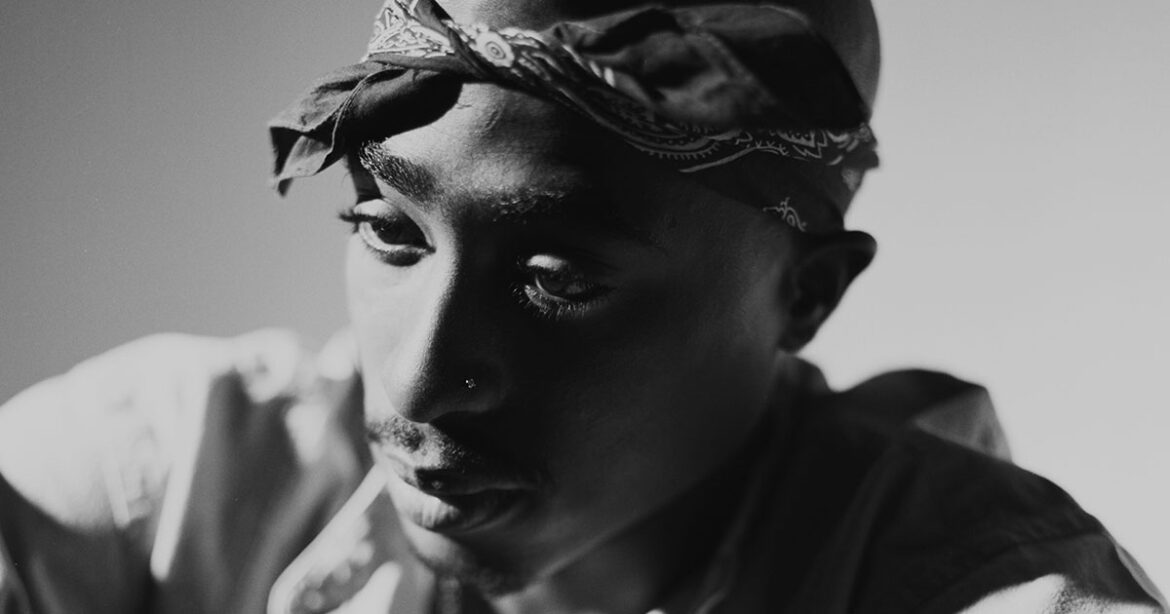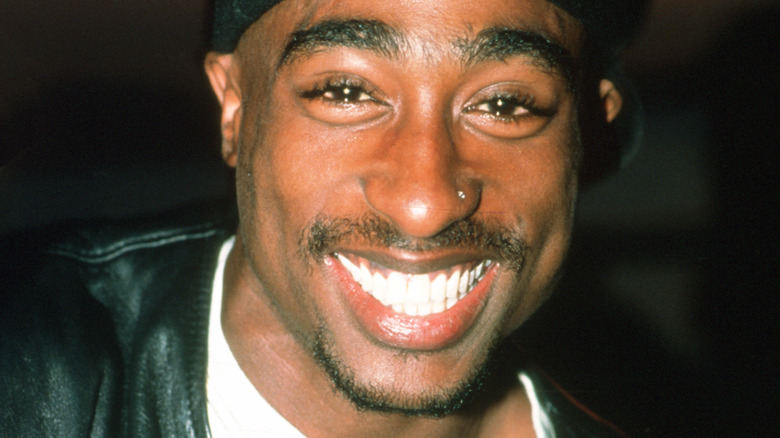
2Pac or Tupac Amaru Shakur was born Lesane Parish Crooks on June 16, 1971, in East Harlem, New York City, remains an indelible figure in the pantheon of American hip-hop and a cultural icon who transcended his genre to impact broader society.
Known primarily by his stage names, 2Pac and Makaveli, Shakur’s influence reverberates through the music industry, academia, and social movements dedicated to addressing racial and social injustices. His work as a rapper, poet, and actor, as well as his legacy as a vocal advocate for Black empowerment and political consciousness, cemented him as one of the most significant figures in late 20th-century American culture. A prolific artist and an articulate, sometimes polarizing spokesperson for marginalized communities, Tupac sold over 75 million records worldwide, leaving an indelible mark on music and culture despite his life being cut short by violence at the age of 25.
Early Life and Background
Shakur was born to Afeni Shakur and Billy Garland, both active members of the Black Panther Party, an influential Black liberation organization during the 1960s and 1970s. His mother, Afeni, played a crucial role in shaping his political and social consciousness, exposing him from an early age to discussions about race, class, and power structures in America.
The original choice of his name—Tupac Amaru—was derived from an 18th-century Incan revolutionary who resisted Spanish colonization in Peru, symbolizing his family’s deep-rooted ties to revolutionary struggle and anti-colonial resistance. Shakur’s early environment, a mix of political activism and systemic oppression, profoundly influenced his worldview and later artistic themes.
As a child, Tupac moved frequently, spending periods in Harlem, Baltimore, and eventually Marin City, California. In Baltimore, he attended the Baltimore School for the Arts, where he studied acting, poetry, jazz, and ballet, showcasing talents that would later inform his rap persona.
It was in Baltimore that he began writing poetry, an art form that would weave itself into his later lyrics, where he often touched on themes of pain, resilience, and social justice. His background in the arts made him a well-rounded artist who not only expressed himself through music but also possessed a deep sensitivity to storytelling, which would come to life in his powerful lyrics.
Music Career and Lyrical Themes
Tupac’s music career began in the late 1980s as a roadie and backup dancer for the hip-hop group Digital Underground. Soon after, he launched his solo career with the album 2Pacalypse Now (1991), which introduced his style—poignant, socially conscious, and unflinchingly critical of American society.
His lyrics often tackled issues affecting Black Americans, such as police brutality, poverty, systemic racism, and inner-city struggles. Songs like “Brenda’s Got a Baby” and “Keep Ya Head Up” highlighted the struggles of Black women and the trials faced by marginalized communities. Shakur’s work from this period signaled a significant shift in the rap landscape, combining gangsta rap’s edge with socially conscious content that pushed audiences to think critically about societal issues.
.
.
Shakur’s lyrics were deeply reflective of the anger, frustration, and sense of injustice felt by many young African Americans. His song “Changes” encapsulates his perspective on the ongoing struggles of Black Americans and the seeming stagnation in social progress, touching on police violence, economic hardship, and systemic inequality. In this song, he paraphrases Malcolm X, urging listeners to understand the cyclical nature of poverty and discrimination: “I see no changes, all I see is racist faces / Misplaced hate makes disgrace to races we under.” The vulnerability and honesty in his music fostered a deep connection with fans, who found in his lyrics a voice that represented their own experiences and struggles.
At the same time, Tupac became associated with the “gangsta” persona, fueled partly by his engagement with the West Coast-East Coast rivalry that dominated the rap industry in the 1990s. His albums Strictly 4 My N.I.G.G.A.Z. (1993), Me Against the World (1995), and All Eyez on Me (1996) each showcased his versatility and lyrical skill. However, Shakur’s music also featured themes of revenge, survival, and violence, elements that reflected both his life experiences and the gritty realities of life in marginalized urban communities. His track “Hit ‘Em Up” remains one of the most infamous examples of a rap diss track, showcasing the competitiveness and intensity of the East Coast-West Coast rivalry.
Acting and Poetry
In addition to his music, Tupac also found success as an actor. His performances in films such as Juice (1992), Poetic Justice (1993), and Above the Rim (1994) displayed his versatility and talent beyond the music world. His role in Juice, in particular, where he played a young man caught in a web of violence and ambition, earned him critical acclaim. His foray into acting further broadened his impact on American pop culture and allowed him to portray the complexity of young Black men, countering the often one-dimensional narratives in mainstream media.
Poetry was another vital aspect of Tupac’s creative expression. His poetry collection, The Rose That Grew from Concrete, published posthumously, captures the essence of his inner world and presents a different facet of his personality—introspective, hopeful, and vulnerable. In the poem “The Rose That Grew from Concrete,” he uses the metaphor of a rose growing in unlikely conditions to express the strength required to overcome adversity and flourish despite societal obstacles. The poetry collection further cemented his status as a multi-dimensional artist whose work extended beyond the constraints of genre.
Social and Political Activism
Tupac Shakur’s music and public life were inseparable from his activism, often reflecting the radical ideals instilled in him by his family. He frequently referenced political issues in his work, addressing themes like police brutality, institutional racism, and economic oppression.
The song “Holler If Ya Hear Me” reflects his call to action, urging Black communities to resist and to stand up against oppression and violence. He also spoke out against inequality in public appearances, interviews, and music videos, frequently urging Black people to seek unity and justice. Although he was often criticized for the more aggressive elements of his persona, his radical approach was, in many ways, a form of social commentary on the experiences of Black Americans in the 1990s.
His political influence also found expression in his pseudonym “Makaveli,” inspired by the Italian political philosopher Niccolò Machiavelli, whose works on strategy, power, and survival influenced Shakur’s views on resilience and ambition. This persona became the foundation of his final studio album, The Don Killuminati: The 7 Day Theory, where he explored themes of betrayal, redemption, and survival with a philosophical edge. Through this persona, Shakur highlighted the struggle of the individual against an often hostile world, and many fans and academics have speculated that this deeper self-reflection foreshadowed his awareness of his impending death.
.

.
Legacy and Influence
Tragically, Tupac Shakur’s life ended on September 13, 1996, six days after a drive-by shooting in Las Vegas. His death shocked the world and left a lasting void in hip-hop. In the decades following his death, Tupac’s legacy has only grown, as fans, artists, and academics continue to analyze and celebrate his work. He is frequently cited as one of the greatest rappers of all time and remains a central figure in hip-hop culture.
Tupac’s influence extends far beyond the music industry. He has been the subject of numerous books, academic studies, documentaries, and even college courses that dissect his lyrics, life, and social impact. Universities across the United States offer courses examining Tupac’s work and its significance in understanding issues of race, class, and identity. His contributions to hip-hop are often compared to those of figures like Bob Dylan or John Lennon, artists who used music as a tool for social change and as a mirror reflecting society’s contradictions.
His message continues to resonate today, particularly in the Black Lives Matter movement and among artists who use their platforms to advocate for social justice. His call for justice, equality, and social awareness has inspired countless rappers, poets, and activists to speak out against oppression and to address the issues that continue to affect Black communities in America and beyond.
Conclusion
Tupac Shakur’s brief yet influential life and career made him one of the most complex and beloved figures in American culture. His legacy as a rapper, poet, actor, and activist reflects his belief in the power of art as a vehicle for social change.
Whether addressing the struggles of marginalized communities, confronting his personal demons, or calling for solidarity within the Black community, Shakur’s work continues to influence new generations. His fearless exploration of life’s complexities, particularly the intersection of joy, pain, and resilience, has made his voice timeless. Even in death, Tupac remains a revolutionary figure whose message continues to challenge and inspire, making him an enduring symbol of hope, resistance, and creative defiance.
If you found this interesting please share it with your friends and family, and check out some of our other articles on Musicians who Died.
.


Pingback: Biggie Smalls, The Notorious B.I.G., was killed on March 9, 1997 - Dead Musicians
Pingback: The Legacy of Fallen Hip-Hop Icons - Dead Musicians